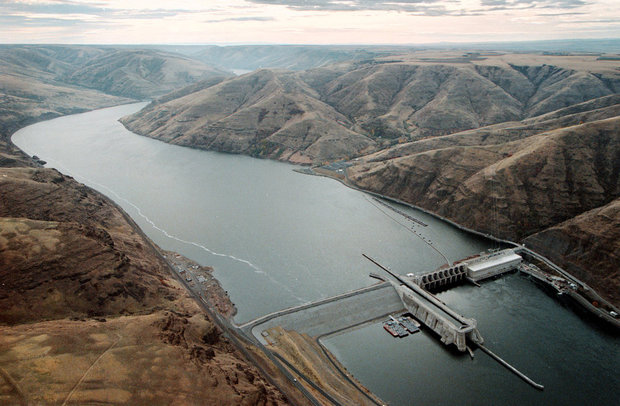forum
library
tutorial
contact

Fishing Group Goes to Court Over
Washington State Salmon Management
by Kimberly Cauvel
Skagit Valley Herald, October 30, 2020
|
the film forum library tutorial contact |

|
Fishing Group Goes to Court Over
by Kimberly Cauvel
|
"We thought 2019 was the low-water mark, and it couldn't get any worse,
and then 2020 proved us wrong," -- Brett Rosson, president of Fish Northwest.
 A nonprofit group spearheaded by the owner of a Washington fishing charter is challenging the state Department of Fish and Wildlife's management of salmon under a landmark federal court decision, but the state agency has countered that the group has no legal standing.
A nonprofit group spearheaded by the owner of a Washington fishing charter is challenging the state Department of Fish and Wildlife's management of salmon under a landmark federal court decision, but the state agency has countered that the group has no legal standing.
The group, Fish Northwest, argues that Fish and Wildlife has failed to meet the requirements set by the Boldt decision, which mandated in 1974 that the state comanage fisheries with treaty tribes.
"What we are asking for is not to overturn the Boldt decision; we just want the Boldt decision enforced," said Brett Rosson, owner of Highliner Charters out of Anacortes and president of Fish Northwest.
Fish Northwest's motion, filed Oct. 5, asks to intervene in the court case that began in 1971. The organization says its goal is to ensure nontreaty fishermen get their fair share of opportunity -- in days on the water and number of fish -- to pursue salmon and steelhead in state waters. They say that hasn't happened for years.
"The non-treaty fishers of Washington are currently not allowed to harvest their fair share of the salmon and steelhead resources of Washington," the motion states.
However, Fish and Wildlife filed its own motion last Monday opposing Fish Northwest's attempt to intervene.
Fish Northwest and its lawyers interpret the Boldt decision as meaning treaty tribes get half the fish and nontreaty fishermen get half the fish of each fishery, each year.
The motion to intervene says recreational fishermen "are guaranteed the right to catch a minimum of 50% of the available harvest." Fish Northwest wants to regain equal sharing.
"Our organization's mission of promoting fishing, including fair and sustainable access to the salmon resource, is impaired by the state of Washington's failure to take action necessary to ensure 50/50 sharing of the salmon resource," Rosson said in a personal declaration filed along with the motion to intervene.
Fish and Wildlife, however, contends that it alone is the agency responsible for managing the state's portion of the resource. And it's legal responsibility is protection of the resource first -- and fisheries second.
"Washington State law makes clear that 'Wildlife, fish, and shellfish are the property of the state.' (under) RCW 77.04.012. Thus, salmon are the property of the State, and individual harvesters have no legally recognized personal interest in salmon," the motion states.
Fish and Wildlife is tasked with first, making sure its resources are conserved, and second, maintaining the economic well-being and stability of the commercial and recreational fishing industry, its motion states. It also notes that previous attempts to intervene or force a change in the management have failed -- and should again.
Patrick Pattillo, who worked for Fish and Wildlife for 36 years and led negotiations for Puget Sound fisheries for 15 of those years, submitted a declaration in support of Fish Northwest's motion.
"The harvest imbalance is known and has occurred consistently for years," Pattillo's declaration states.
Other Puget Sound fishing groups have expressed frustration with unequal sharing of fish in the past.
Rosson said restrictions on recreational fishermen this year were a particularly hard hit.
"A bunch of us fishermen just threw our arms up and said this is ridiculous. We thought 2019 was the low-water mark, and it couldn't get any worse, and then 2020 proved us wrong," he said.
This year, Rosson has had little opportunity to take customers fishing on Puget Sound. Fishing for what's usually the region's biggest fishing draw, Chinook salmon, has been cut from about eight months of the year in 2014 to about six weeks this year.
"This year they only gave us July and two weeks in August, and then they went ahead and closed winter," Rosson said. "I've got six months with no fishing."
Fish and Wildlife sent the Skagit Valley Herald a statement Thursday evening about the case:
"We share with recreational anglers, including Fish Northwest, a deep concern over the decrease in Chinook salmon fishing opportunities in Puget Sound and a desire to improve fisheries and provide more harvestable salmon. However, the request by Fish Northwest to join the federal government, the State of Washington, and the tribes as a party to U.S. v. Washington does not meet legal standards established by the court."
The statement says the agency continues to work on recovery of Chinook salmon and ultimately the fisheries.
learn more on topics covered in the film
see the video
read the script
learn the songs
discussion forum
